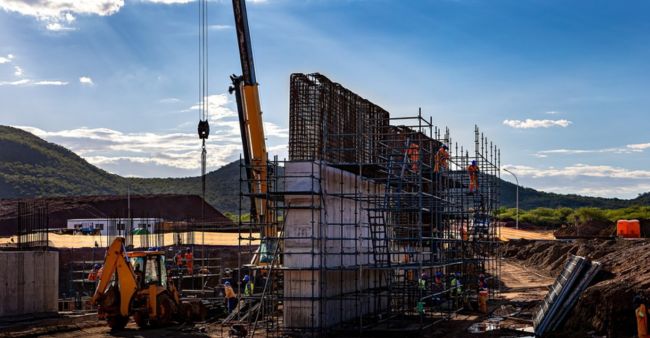An area of concern for global investors is India’s tax structure, with sudden changes impacting certain sectors, such as the gaming industry, which faced a 28% GST on gross revenue.
I really feel that India is at a tipping point, and it’s great to be there.
Tim Cook, Apple CEO
The investment climate in India has undergone significant transformations, positioning it as an attractive destination for global investors. India has experienced a remarkable surge in Foreign Direct Investment (FDI) over the last decade, marking a significant milestone in its economic journey. The country witnessed an impressive growth of 85.09% since 2015, reaching the highest-ever annual FDI inflow of US$83.57 billion in FY22 (data from Department for Promotion of Industry and Internal Trade). This surge reflects the increasing confidence of global investors in India’s compelling growth story. Although FDI inflows slightly moderated to US$70.97 billion in FY23, the last quarter of FY23 saw the highest-ever quarterly inflow at US$15.50 billion.
The sectors that have attracted the most equity FDI from April 2000 to March 2023 were Banking Financial Services and Insurance (BFSI) & Information Technology (IT) attracting a combined 31% equity FDI during April 2000 to March 2023, followed by Telecom (6%) and Automobile (6%). Notably, countries such as Mauritius, Singapore, and the UShave been among the highest investors in India benefiting from favourable tax treaties, investor-friendly policies, and strategic alliances.
India’s economic ascent has been remarkable, moving from the 13th position in global GDP rankings in 2000 to the 5th position in 2022, according to the World Bank. The country’s economy has emerged as one of the world’s fastest-growing, displaying resilience and adaptability even amidst global uncertainties. With a population of over 1.3 billion and a growing middle class, India’s domestic consumption-driven market presents vast potential for businesses seeking to tap into this massive consumer base.
Corporate giants like Apple plan to increase their investments here, positioning it as the fifth-largest iPhone market overtaking Germany and France. Improving business environment in India coupled with diminishing political and economic conditions in China have helped to garner cherry points from many corporates who are shifting their manufacturing bases here. In fact, Apple has decided to shift 20% of its iPhone manufacturing to India from China.
Amazon’s CEO, Andy Jassy, announced an additional $15 billion investment by 2030 in India, while Google’s Sundar Pichai shared plans to develop a fintech center in Gujarat International Finance Tech City (GIFT City). But it’s not just tech biggies who are pumping in money. US-based investor Blackstone’s president and chief operating officer Jonathan Gray said, “India is one of the best performing markets”. Honeywell is contemplating to double its existing US$1 billion business in India as per the company’s president, Ashish Modi. Tesla has also shown interest to invest in India again. EV maker’s earlier plans got dismissed owing to the import taxes on electric vehicles and components.
The startup ecosystem in India has become a global attraction, drawing significant venture capital and private equity investments. In 2022, Indian startups raised $27 billion, of which $26 billion came from rounds where foreign investors participated.
While India’s investment landscape is thriving, certain challenges pose concerns for investors. Infrastructure, for instance, has witnessed impressive growth, but recurring monsoon-related issues, such as flooding rivers, disrupt daily life in prominent business cities like Mumbai, Delhi, Bengaluru, and Punjab.
Another area of concern for global investors is India’s tax structure, with sudden changes impacting certain sectors, such as the gaming industry, which faced a 28% GST on gross revenue. Many believe that the way government enforcement agencies work in India is holding private investments. Too much control scares business houses into making large and long-term commitments. Economist and founder of Breakout Capital Ruchir Sharma says that “I think there’s the fear whether the income tax department, CBI or ED is on your case”. Another instance is a recent licensing requirement for the import of laptops and notebooks as well as ban on export of Basmati rice. As per the Henley Private Wealth Migration Report 2023, about 6,500 Indian millionaires are expected to leave the country in 2023, only next to China.
The uneven development of economic hubs like special economic zones (SEZs), export promotion zones (EPZs), and the recent mega global financial centre (GFC) in Gujarat is not conducive to the holistic growth of the country. The noticeable economic disparity among states, with only the top 5 states (Maharashtra, Tamil Nadu, Uttar Pradesh, Gujarat, and Karnataka) contributing about 50% of India’s total GDP, suggests that our resources have not been optimally utilized.
Some investors have faced challenges and have withdrawn their operations from India due to policy complexities, infrastructure bottlenecks, and bureaucratic hurdles. For instance, US-based auto leader Ford and bike maker Harley-Davidson discontinued their India operations in recent years, along with other notable exits like Cairn Energy, Daiichi Sankyo, and Carrefour.
Despite these challenges, India’s investment climate is marked by immense promise and potential. The Make in Indiacampaign has significantly contributed to transforming the country into a global manufacturing hub, attracting foreign companies to establish production facilities. As India moves forward on its path of development, the collective efforts of policymakers, businesses, and investors will be crucial in unlocking the true potential of the Indian economy.
Rajesh Mehta is a leading International Consultant in the field of Market Entry, Innovation & Public Policy.
Sunny Sabharwal is a Chartered Accountant, ex-banker and a financial writer.

